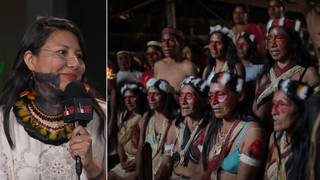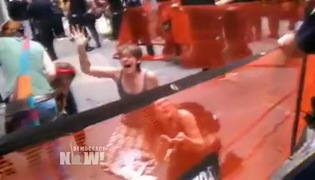
Topics
Guests
- Cornel Westprofessor of religion and African American studies at Princeton University and author of numerous books, including his memoir, Brother West: Living and Loving Out Loud.
Princeton University professor and renowned civil rights activist Cornel West was arrested Friday afternoon during a demonstration in Harlem against alleged racial profiling by the New York City Police Department. West joined a protest against the NYPD’s stop-and-frisk policy, which critics say disproportionately targets people of color. New York City police carried out 600,000 such searches last year, with 87 percent of the targets being black or Hispanic. West’s arrest in New York City comes just a week after he and 18 others were arrested on the steps of the U.S. Supreme Court during a protest against the increasing role of money in politics, the same day that the new Dr. Rev. Martin Luther King, Jr. Memorial was dedicated. A professor of religion and African American studies at Princeton University, West is the author of numerous books, including his memoir, “Brother West: Living and Loving Out Loud.” [includes rush transcript]
Transcript
AMY GOODMAN: I wanted to turn, as we go back to Cornel West now, to comments of President Obama, who was speaking not far from where Cornel West was last Sunday. President Obama was speaking at the dedication of the Martin Luther King Monument on the National Mall, talking about the violence people suffered for every victory.
PRESIDENT BARACK OBAMA: It is right for us to celebrate Dr. King’s marvelous oratory, but it is worth remembering that progress did not come from words alone. Progress was hard. Progress was purchased through enduring the smack of billy clubs and the blast of fire hoses. It was bought with days in jail cells and nights of bomb threats. For every victory during the height of the civil rights movement, there were setbacks and there were defeats.
AMY GOODMAN: That was President Obama. He was talking about the civil rights movement.
CORNEL WEST: Yes, and just—well, what is necessary to bring about—
AMY GOODMAN: Professor Cornel West, you were just down the road getting arrested in front of the Supreme Court. Why on that day that the monument to Dr. King was—
CORNEL WEST: You know, Sister Amy, I didn’t not want the day to go by without really paying homage and honoring King as the revolutionary that he was.
AMY GOODMAN: So you weren’t there at the ceremony.
CORNEL WEST: No, no, I was actually at Temple of Praise with Bootsy Collins. He and I were at church with Bishop Staples.
But what comes through so clear, and what I just love about your show, is the eloquence of those Sly Stone called “everyday people.” You just listen close to that wisdom speaking, as Cicero and Quintilian would define “eloquence,” and to juxtapose that with the words of politicians—I don’t care what color, because of course we want to protect and respect everybody, including the President, but we want to correct them in the ways in which they’re complicitous in a system that makes it difficult for the dignity and for the decency of everyday people to be seen and accented. And just listening to those words, that’s what the freedom movement of the '60s was all about. That's what the feminist movement, anti-homophobic movement, the labor movement, the movement for elderly and, most importantly for me, our children—we haven’t really talked enough about the 42 percent of our precious kids of all colors, precious children, who live in or near poverty in the richest nation in the history of the world. It’s a moral disgrace. But that eloquence that comes through among everyday folk, and that the older woman—you see the beauty and the dignity in her face? “I want a system of affordable healthcare, affordable Social Security,” and so forth. No, we’re in a magnificent moment of democratic awakening.
AMY GOODMAN: You are getting arrested every week now. Last week at the Supreme Court—why in front of the Supreme Court?
CORNEL WEST: Well, we just thought it was very important to make the connection between corporate greed and some of the recent decisions of the Supreme Court, the ways in which the supreme law has been complicitous with the system that allows for unaccountable corporate greed, allows for the unaccountable quest for profits, that downplays the needs of people.
AMY GOODMAN: And then this week, on Friday, you get arrested with a number of other people in Harlem to protest the New York Police Department’s stop-and-frisk policy, which Mayor Bloomberg says is needed to deal with crime in New York.
CORNEL WEST: Yeah, anyway, [inaudible], oh, what a lie. You know, under Giuliani, you had 86,000 people who were stopped and frisked. That’s 2001. Last year you had 600,000. From 86,000 to 600,000, and we’re on the way to 700,000. So when my dear brother Carl Dix, who I love deeply—and he’s tied to the leadership of Brother Bob Avakian, Revolutionary Communist Party—I believe in working with everyone in this regard. As a revolutionary Christian, I’m willing to work with my Jewish brothers and sisters, my communist brothers, socialists, anarchists, atheists, agnostic, prophetic Mormons, and prophetic Baptists like myself. It’s an all-inclusive movement.
AMY GOODMAN: Republicans and Democrats?
CORNEL WEST: If Republicans are willing to fight corporate greed.
AMY GOODMAN: And Democrats?
CORNEL WEST: If they’re willing to fight corporate greed. The problem is, not enough are. And of course, when you get elected officials, and big money oftentimes being, if not determinative, too excessively influential in terms of how they act. That’s the problem.
AMY GOODMAN: Harry Belafonte said, before President Obama was elected, he saw him on Wall Street—interestingly enough, that Wall Street address that he gave—and he said, “Why don’t you and Cornel West cut him some slack?” And Harry Belafonte said, “Well, what makes you think we’re not?”
CORNEL WEST: “What makes you think we’re not?” It’s true. Brother Harry and I had wonderful talks about that. We, of course, pay tribute to that brother—his book and the film that’s recently come out. But he’s still a freedom fighter at 80-some years old. But I mean, part of the problem these days, I think, about Obama is too many people think of him in an isolated way, that when you see the President, you should see the administration. You should see Geithner. You should see Goolsbee. You should see the whole. You should see Dennis Ross, the whole administration, and the ways in which it tilt toward the powerful and the wealthy, and the ways in which it is head of not just a system, but an empire—the innocent people, immoral acts of those drones dropping bombs on innocent people.
AMY GOODMAN: You said you were, when we last talked to you with Tavis Smiley on your poverty tour through the United States, that you’re looking for someone to run for president — on the Democratic ticket, or on a third-party ticket? — that would represent some of what you’re saying..
CORNEL WEST: Well, it was my dear brother Ralph Nader who came up with the idea of running a slate in the primary, so it wouldn’t really be against Obama in the general election. We haven’t got there yet, but just to have a robust conversation about poverty. And Brother Tavis, of course, who came up with the idea of the poverty tour. Can we get anybody to talk about a war on poverty, to decentralize banks, taxes on the financial transactions on Wall Street, taxes on derivatives and so forth, the kind of thing that Matt—Brother Matt Taibbi—
AMY GOODMAN: Ah, ah, Matt Taibbi.
CORNEL WEST: —talked about in Rolling Stone, in terms of recommendations. I think he’s onto something very important here. But that was the kind of concern that Brother Tavis and I had. And we just were trying to build on Martin’s Poor People Campaign.
AMY GOODMAN: By the way, you and Larry Summers, when he was president of Harvard, not when he was helping to run the country, had a run-in. He didn’t like your hip-hop CDs. I don’t think it was the music he was concerned about, or just the fact that you were doing it. So you ended up leaving Harvard, going to Princeton. How does Princeton feel about your activism today? And is there an Occupy Princeton?
CORNEL WEST: You know what? Princeton is a heterogeneous institution. We got Ralph Nader and Edward Said. We’ve got Rumsfeld and George Shultz. I mean, so it goes both ways. But we’ve got a magnificent president in my dear sister Shirley Tilghman. And so, she fundamentally believes in academic freedom and individual expression. And Brother David Dobkin, as well.
AMY GOODMAN: So where are you headed next?
CORNEL WEST: So I’m headed next—you know, we’ve got another event November the 1st in Brooklyn tied to the stop-and-frisk actions, as well. I think I actually may be out of the country to see my beloved daughter. But we’re building on each one of these prongs, each one of these pillars, of the movement.
AMY GOODMAN: How is the stop-and-frisk policy related to Wall Street, do you think?
CORNEL WEST: Oh, it’s directly related, because once you talk about repressive apparatus of the nation state and talk about the police department, you’re actually talking about the ways in which persons who have been socially neglected and economically abandoned are dealt with. So when you’re talking about black brothers and sisters in the hood, you’re talking about those persons who have been left out and the ways in which intense police surveillance, the ways in which—police harassment, almost view them as cannon fodder for the prison-industrial complex. And so, when Mumia Abu-Jamal and the other prophetic voices say, “You know what? We’ve got to make sure we have an integrative perception of what is going on and a systematic analysis of what’s going on—empire, race, class, sexual orientation, ageism.”
AMY GOODMAN: We have to leave it there.
CORNEL WEST: Thank you so much.
AMY GOODMAN: Cornel West, I want to thank you very much for being with us. Cornel West, Princeton professor, arrested twice in a week—
CORNEL WEST: Amy, I salute you. I salute you, Sister Amy. I salute you.
AMY GOODMAN: —in Washington, D.C. and, well, as well in Harlem. Oh, by the way, you can read about Democracy Now! in today’s New York Times , page three of the business section: “A Grass-Roots Newscast Gives a Voice to Struggles.” Check it out, tweet it around, send it to your friends. We’ll link to it on our website and on our daily digest, which you can sign up for. You can check out Juan Gonzalez and Joe Torres’s tour, as they travel the country.












Media Options